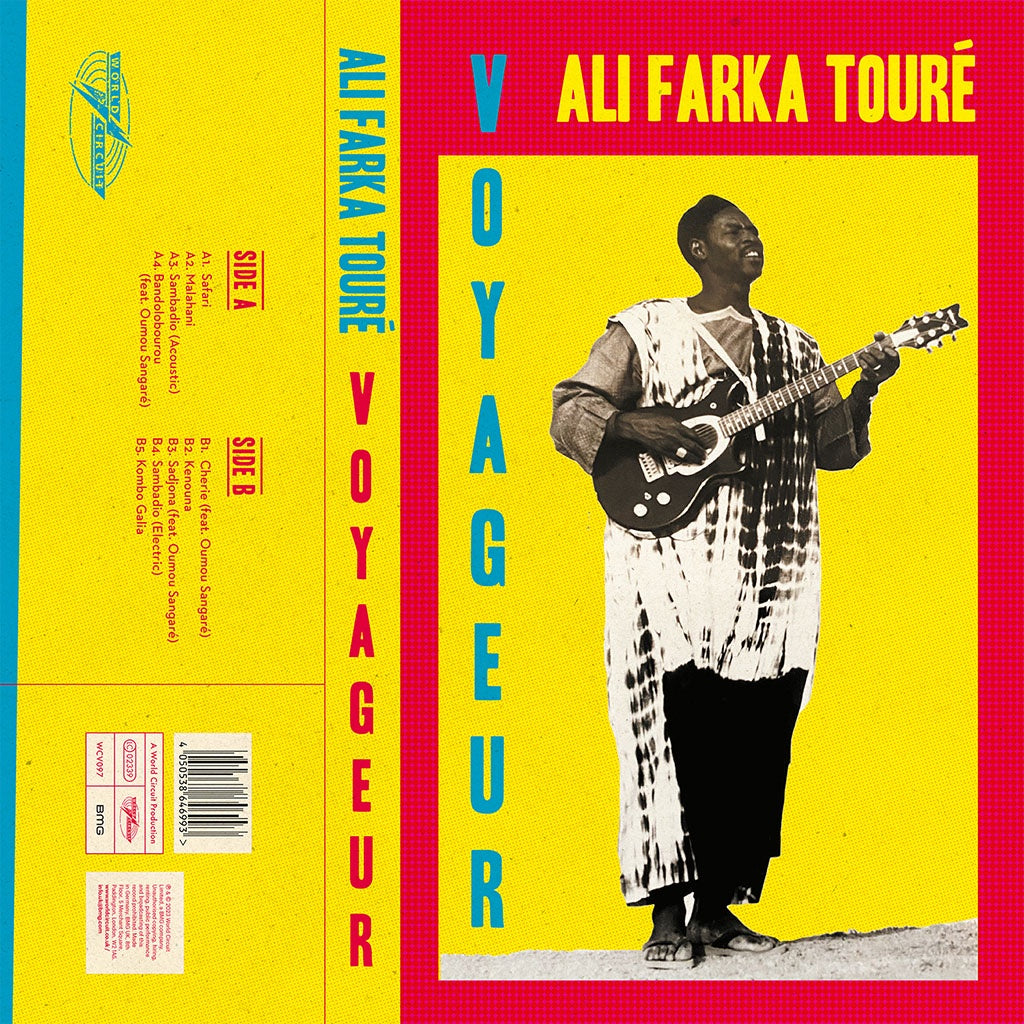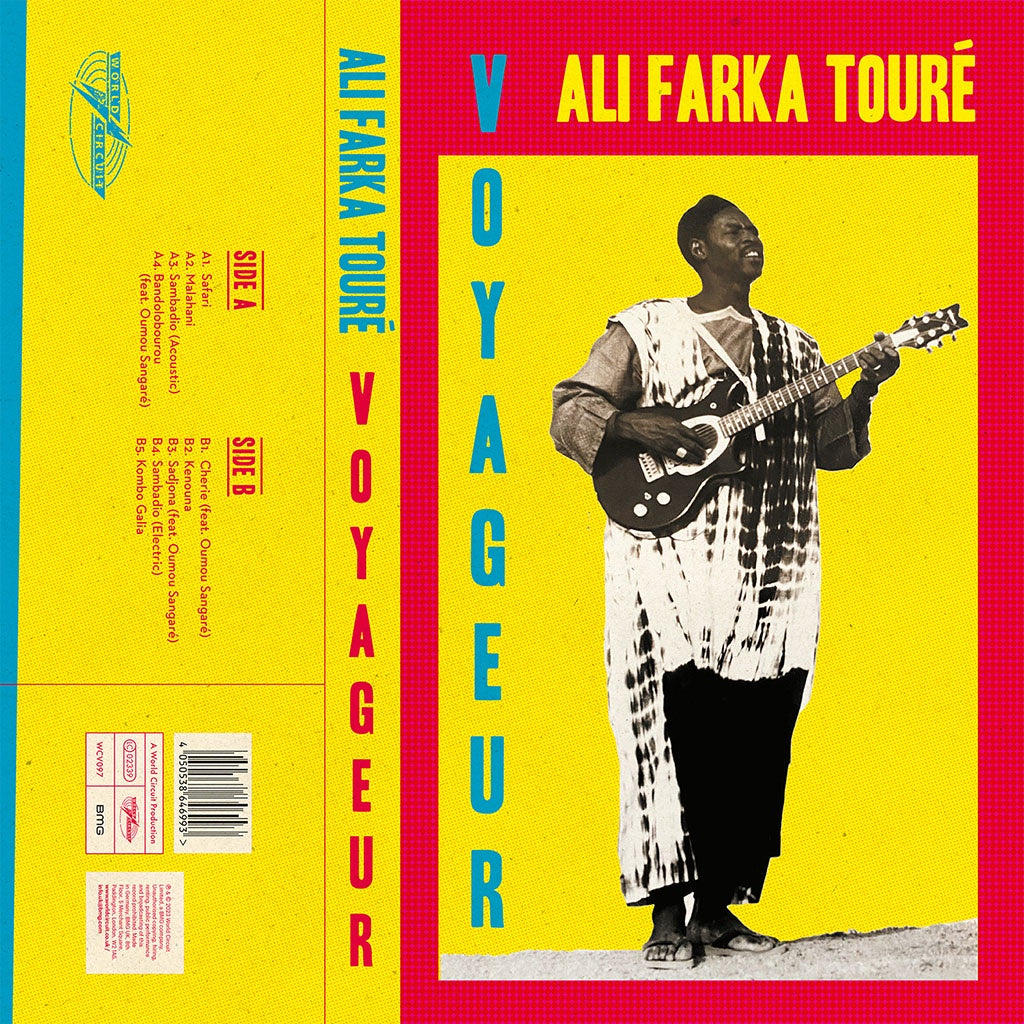Ali Farka Touré Voyageur
-
Regular price
-
$48.00 SGD
-
Regular price
-
-
Sale price
-
$48.00 SGD
- Unit price
-
per
Couldn't load pickup availability
About
A collection of songs the iconic Malian guitarist and his collaborators recorded at jam sessions and concert rehearsals between 1991 and 2004 reflects the timeless vitality of his music.
Ali Farka Touré lived life on his own terms. Hailing from a noble lineage, he overcame his family’s disapproval to become a musician, and as a young boy taught himself to play the njerkle (single-string guitar), njarka (single-string fiddle), and ngoni (four-string lute). He took up the guitar after seeing the Malinké guitarist Fodéba Keita play with the national dance company of Guinea, and his unique playing style quickly made him a star in Mali. Touré would find international fame later in life, but it’s impossible to overstate his impact: He was the first musician to introduce the mesmerizing sounds of desert blues to the world, and his legacy lives on through the music of his son, Vieux Farka Touré, and the long line of Malian musicians who’ve followed.
Despite all this Touré considered himself first and foremost a farmer, and spent the better part of his final decade tending to his farm in his hometown of Niafunké, where he was also elected mayor. But whether touring the world or at home in Mali, Touré was at heart a traveler, someone who went into the world with open arms and invited people into his own. When he died in 2006, Ry Cooder said: “Ali was a seeker. There was powerful psychology there. He was not governed by anything. He was free to move about in his mind.”
Voyageur, produced by his son Vieux and World Circuit’s Nick Gold, reflects this sense of freedom. Recorded between 1991 and 2004 during improvised jam sessions and concert rehearsals, the album’s nine tracks capture Touré’s life on the road, the warmth and naturalness of his collaborations, and his unswerving commitment to preserving the traditions of his homeland. The record flows so naturally it’s easy to forget these tracks were not made to go together.
Album opener “Safari” (which means journey in Swahili) is immediately recognizable as Touré’s classic Sonrhaï style, underscoring his winding guitar refrain with the regular beat of the calabash and the occasional flourish of tambin (flute). The steady rhythms echo the regular pace of a long workday, while Touré’s powerful, unwavering voice seems to offer strength and guidance to the chorus of voices that follow, as his guitar slips out into a focused, whirling solo.
Touré’s guitar always leads the way without overshadowing—he leaves enough space for his fellow musicians to insert themselves and comfortably mold their playing to his. On the acoustic version of “Sambadio,” a Fula song in honor of farmers, the springy, plucked notes of Bassekou Kouyaté and Mama Sissoko’s ngoni chime off Touré’s sharp guitar line, while the regular thump of the calabash anchors the wandering strings. Hama Sankaré and Afel Bocoum’s delicate backing vocals carry through to the song’s electric version, which is transformed by Pee Wee Ellis’ jazzy arrangements and Steve Williamson’s playful sax. But even amid all the extra flourish, Touré’s voice commands attention as he picks up a note and settles into it with astonishing ease, the sax almost shy next to his self-assured delivery.
Perhaps the most significant guest on Voyageur is vocalist and longtime Touré collaborator Oumou Sangaré, whose three appearances represent some of the record’s high points. “Bandolobourou,” with its spiraling guitar and colorful mosaic of percussion, feels warm and intimate, like a late-night conversation between friends. At times during the propulsive “Cherie” the two musicians sound engaged in a playful competition, each trying to impress the other—Touré with his agile guitar trills and Sangaré with her ululations and vocal acrobatics—before rejoining the central refrain in enchanting unison. On “Sadjona,” a traditional Wassoulou song for hunters, Sangaré’s majestic voice rides an insistent kamele ngoni groove as she improvises a paean in honor of Touré, predicting the vast celebrations that would take place upon his passing. It’s half jest, half recognition of Touré’s immeasurable standing.
When Touré eventually did die in 2006, 11 years after this song was recorded, Mali’s public radio stations suspended regular programming to play his music. Today, he is revered as one of Africa’s greatest musicians, and a statue now stands near his house in Bamako. Posthumous releases like Voyageur continue to shed light on his vast, and still partially unheard, catalog. Though decades old, the songs collected here sound as current as ever—a testament to the timeless vitality of Touré’s music. - Pitchfork
In 2011, the posthumous album Ali & Toumani, a duet with Bamako korist Toumani Diabaté, won a Grammy. And seventeen years after the death of the great Malian master Ali Farka Touré, his label World Circuit delivers – sparingly – nine original tracks. Compiled in the album Voyageur, these compositions add to the impressive discography of Farka, international icon of Malian wallahidu.
Produced by Nick Gold, founder of World Circuit, and Vieux Farka Touré, son of the artist and renowned musician, Voyageur will be available on March 10. In anticipation, the single “Safari” offers a glimpse of the opus, driven by “the clean, haunting melodies of Ali’s signature Songhai, through the anthemic choruses of the fishermen and the pulsating rhythms of the hunters”. All in all, a majestic set of Sahelian blues, worthy of the musical legacy left by one of the greatest names in African music. - PAM
Label:
World Circuit – WCV097
Format:
Vinyl, LP, Album, Stereo
Released:
2023
Genre:
World, Funk / Soul, Folk
Style:
African, Funk, Electric Blues
Share
- Regular price
- $48.00 SGD
- Regular price
-
- Sale price
- $48.00 SGD
- Unit price
- per
Couldn't load pickup availability
About
A collection of songs the iconic Malian guitarist and his collaborators recorded at jam sessions and concert rehearsals between 1991 and 2004 reflects the timeless vitality of his music.
Ali Farka Touré lived life on his own terms. Hailing from a noble lineage, he overcame his family’s disapproval to become a musician, and as a young boy taught himself to play the njerkle (single-string guitar), njarka (single-string fiddle), and ngoni (four-string lute). He took up the guitar after seeing the Malinké guitarist Fodéba Keita play with the national dance company of Guinea, and his unique playing style quickly made him a star in Mali. Touré would find international fame later in life, but it’s impossible to overstate his impact: He was the first musician to introduce the mesmerizing sounds of desert blues to the world, and his legacy lives on through the music of his son, Vieux Farka Touré, and the long line of Malian musicians who’ve followed.
Despite all this Touré considered himself first and foremost a farmer, and spent the better part of his final decade tending to his farm in his hometown of Niafunké, where he was also elected mayor. But whether touring the world or at home in Mali, Touré was at heart a traveler, someone who went into the world with open arms and invited people into his own. When he died in 2006, Ry Cooder said: “Ali was a seeker. There was powerful psychology there. He was not governed by anything. He was free to move about in his mind.”
Voyageur, produced by his son Vieux and World Circuit’s Nick Gold, reflects this sense of freedom. Recorded between 1991 and 2004 during improvised jam sessions and concert rehearsals, the album’s nine tracks capture Touré’s life on the road, the warmth and naturalness of his collaborations, and his unswerving commitment to preserving the traditions of his homeland. The record flows so naturally it’s easy to forget these tracks were not made to go together.
Album opener “Safari” (which means journey in Swahili) is immediately recognizable as Touré’s classic Sonrhaï style, underscoring his winding guitar refrain with the regular beat of the calabash and the occasional flourish of tambin (flute). The steady rhythms echo the regular pace of a long workday, while Touré’s powerful, unwavering voice seems to offer strength and guidance to the chorus of voices that follow, as his guitar slips out into a focused, whirling solo.
Touré’s guitar always leads the way without overshadowing—he leaves enough space for his fellow musicians to insert themselves and comfortably mold their playing to his. On the acoustic version of “Sambadio,” a Fula song in honor of farmers, the springy, plucked notes of Bassekou Kouyaté and Mama Sissoko’s ngoni chime off Touré’s sharp guitar line, while the regular thump of the calabash anchors the wandering strings. Hama Sankaré and Afel Bocoum’s delicate backing vocals carry through to the song’s electric version, which is transformed by Pee Wee Ellis’ jazzy arrangements and Steve Williamson’s playful sax. But even amid all the extra flourish, Touré’s voice commands attention as he picks up a note and settles into it with astonishing ease, the sax almost shy next to his self-assured delivery.
Perhaps the most significant guest on Voyageur is vocalist and longtime Touré collaborator Oumou Sangaré, whose three appearances represent some of the record’s high points. “Bandolobourou,” with its spiraling guitar and colorful mosaic of percussion, feels warm and intimate, like a late-night conversation between friends. At times during the propulsive “Cherie” the two musicians sound engaged in a playful competition, each trying to impress the other—Touré with his agile guitar trills and Sangaré with her ululations and vocal acrobatics—before rejoining the central refrain in enchanting unison. On “Sadjona,” a traditional Wassoulou song for hunters, Sangaré’s majestic voice rides an insistent kamele ngoni groove as she improvises a paean in honor of Touré, predicting the vast celebrations that would take place upon his passing. It’s half jest, half recognition of Touré’s immeasurable standing.
When Touré eventually did die in 2006, 11 years after this song was recorded, Mali’s public radio stations suspended regular programming to play his music. Today, he is revered as one of Africa’s greatest musicians, and a statue now stands near his house in Bamako. Posthumous releases like Voyageur continue to shed light on his vast, and still partially unheard, catalog. Though decades old, the songs collected here sound as current as ever—a testament to the timeless vitality of Touré’s music. - Pitchfork
In 2011, the posthumous album Ali & Toumani, a duet with Bamako korist Toumani Diabaté, won a Grammy. And seventeen years after the death of the great Malian master Ali Farka Touré, his label World Circuit delivers – sparingly – nine original tracks. Compiled in the album Voyageur, these compositions add to the impressive discography of Farka, international icon of Malian wallahidu.
Produced by Nick Gold, founder of World Circuit, and Vieux Farka Touré, son of the artist and renowned musician, Voyageur will be available on March 10. In anticipation, the single “Safari” offers a glimpse of the opus, driven by “the clean, haunting melodies of Ali’s signature Songhai, through the anthemic choruses of the fishermen and the pulsating rhythms of the hunters”. All in all, a majestic set of Sahelian blues, worthy of the musical legacy left by one of the greatest names in African music. - PAM
| Label: | World Circuit – WCV097 |
| Format: | Vinyl, LP, Album, Stereo |
| Released: | 2023 |
| Genre: | World, Funk / Soul, Folk |
| Style: | African, Funk, Electric Blues |
Share

- Choosing a selection results in a full page refresh.





